A real tour de force, this one. Forty different animes welding into one music video.
video
Angel Beats! rewatch 04 – Day Game

After episode three’s angst, episode four is welcome comedy relief. It’s also mixed up Angel Beats! established formula a lot, as for the first time we get a cold opening rather than the theme song, a flashback to an unknown character’s life, something that will become relevant later in the episode. This is followed by the audience for the new lead singer of Girl Dead Monster, the former lead singer Iwasawa of course having disappeared last time. That leads into a new version of the opening song, as performed by GiDeMo, with the new recruit, the band’s groupie Otonashi encountered last episode singing the lead part.
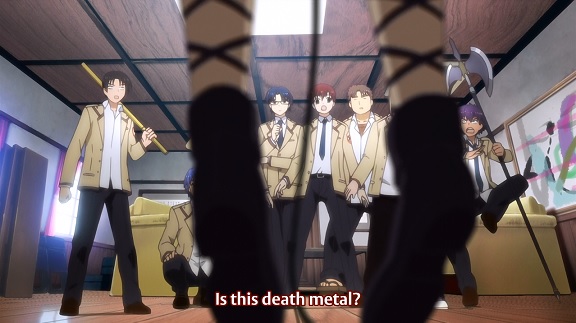
Unfortunately said groupie, Yui is a bit of an idiot and manages to strangle herself with her microphone cord at the end of her performance. Death metal indeed. A lively discussion about the merits of letting her be GiDeMo’s lead singer ensues, and what it would mean for the band’s skill at providing diversions. Which naturally leads into the unveiling of Yurippe’s latest plans, which are remarkably low key: the battlefront is to enter the baseball competition and win everything.
There’s a catch of course: any of the Battlefront’s teams that doesn’t win against the NPC teams will get “punishment worse than death”. Which leaves Otonashi in the lurch, as he teamed up with Hideki Hinata, who promised to get all the best members on the team, but instead had to make do with the Front’s collection of idiots, including Yui, who drives Hinata nuts and to frequent physical punishment for her obnoxious behaviour. And really, who hasn’t want to do something like this to a slightly too cutesy cat girl every now and then?
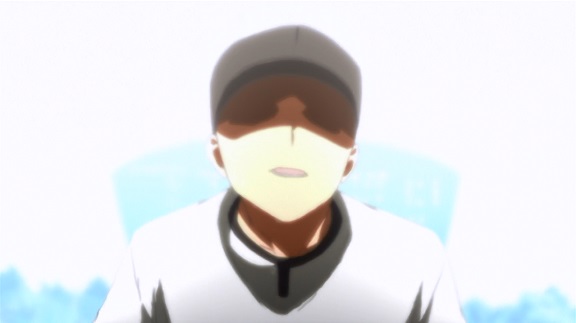
But of course things can’t quite stay this light hearted and in the actual baseball game it’s revealed it was Hinata who had the flashback, remembering how his failure to catch a ball during a final cost his school team the chance to compete in the nationals. If he and his team now win the game, does this means he’ll disappear? Not quite, as it turns out and this remains a humour episode, setting up plot developments but not resolving them, with some more of the Battlefront members getting a bit of screen time. Funny, but slightly out of place in a series with only thirteen episodes, though I appreciate that it isn’t all angst, all the time.
Angel Beats! rewatch 01 – Departure

I first binge watched Angel Beats! on holiday in the South of France a few years when it was far too hot for my body type to actually do anything, sitting outside on the veranda of our holiday house late at night while the rest of the family was fast asleep. My expectations were low at the time, but it turned out to be one of the most compelling and emotional series I’d ever watched. One of those series that stay with you for a long time, which is why I wanted to rewatch it now and look more closely at why it mattered so much, what it got right.
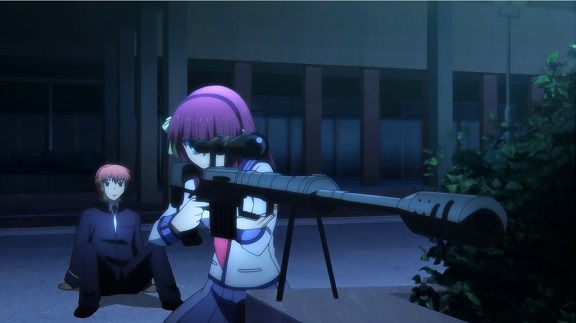
A strong first episode is of course essential to any new series, especially when it’s an original series with no existing body of work in other media to fall back on. Angel Beats starts with the Amber gambit: the protagonist wakes up in a strange world with no recollection how he got there or even who he is. He finds himself in the stands of the athletic fields of what seems to be a high school, facing a girl holding a sniper rifle aiming at something below. That’s Yuri “Yurippe” Nakamura who informs him that a) he’s dead b) he’s in limbo and c) he’s recruited in the fight against god and d) if he doesn’t join he’ll disappear from the world. She also explains that the girl she’s aiming at is Tenshi (angel) their direct opponent, at which point our hero decides to talk to her instead.

Tenshi introduces herself as not an angel, but the student council president, he questions her about the world he is in, she replies that yes, he is dead and should accept the world as he finds it, and then he makes the mistake of shouting at her to prove it. Which she does. By driving a knife through his heart. Waking up the next morning in the school’s infirmary he finds his blood soaked shirt and finally accepts this is real. After this the still nameless protagonist is introduced to the rest of the SSS, the resistance battlefront put together by Yurippe and infodumping happens before the episode is wrapped up by the first battlefront mission.
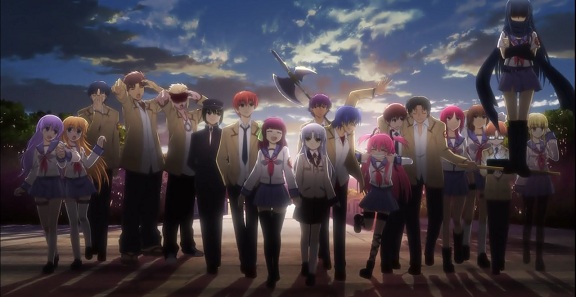
It’s a large cast for a thirteen episode anime and many of the secondary characters therefore are no more than stereotypes; their introduction is remarkably efficient at establishing their parameters. There’s the smart guy with glasses (“acutally an idiot” according to Yurippe), the lead singer of the all girl band, the aggressive loudmouth, the quiet but resourceful girl, the big martial arts guy etc. And there’s TK, the bandanaed English nonsense spouting show stealer. In later episodes a fair few of the cast will get their moment to shine, but for now they’re mainly there as background characters, with the focus purely on Otonashi, as he finally remembers he’s called, Yurippe and Tenshi, with the latter as the unstoppable antagonist.
For a first episode, this does everything right: introduce the main characters, establish the plot and setting, end with an action packed climax so it isn’t all talking heads. There’s even a bit of humour, with TK and the many slapstick deaths of Otonashi. But what sets it apart is the music. Both the opening and ending theme are great, even without the emotional impact they acquire as the series progresses, but even better is “Crow Song”, played by Girls Dead Monster as shown above, during Operation Tornado, the SSS daily operation which ends the episode. The first of what’ll become an album’s worth of great rock songs, good enough that their real live counterparts would play a series of sold out concerts. GiDeMo’s music is at the heart of the series and for me will always be associated with several heartwrenching moments, this song included.
Pshuuu
Wakakozake is almost too cute for words, a series of two minute episode about a young office woman going for something nice to eat after a hard’s day work. It succeeds admirably in making hungry for food I’ve never seen let alone eaten before.
Hibike! Euphonium
When I started watching anime back in the eighties, it was for the science fiction adventure and jiggling cartoon boobs, so I’m just as surprised as you to have found myself watching and enjoying a series about a high school band and their struggle to improve. It’s not like I was a band geek in high school or something; in fact high school bands are rare to non-existent in the Netherlands. There are marching bands (fanfares) but those usually are independent clubs or societies. Perhaps it’s just that, like Shirobako, this is about competent, passionate people pursuing their dreams. There’s also that slightly fannish thrill of having the basics of an unfamiliar craft or profession explained to you.
The plot itself is fairly straightforward. Our protagonist, Kumiko Oumae, is a first year student at Kitauji high school, who used to play in her middle school’s band and has selected kitauji to make a fresh start and reinvent herself. She’s definately not going to play in her new school’s wind ensemble club, especially since it’s not very good, to be polite. Whereas her former school managed to get gold at the prefectural competition, though didn’t advance to the next stage, Kitauji never managed higher than bronze, with the current band members largely demoralised. So obviously Kumiko isn’t going to join. And if her newly found friends convince her to do so anyway, clearly she isn’t going to play the same boring old euphonium she played through middle school, right? Then again the series is called Hibike! Euphonium so perhaps Kumiko’s wishes don’t quite come through.
As Kumiko gets sucked into band life again, the new advisor and music teacher Noboru Taki puts a simple question to them: do they just want to have fun, or do they want to get serious and aim for the nationals? It has to be the second choice of course for a series like this, as we follow the band as it gets serious, straightens itself out and takes its first steps on the road to the nationals. With just thirteen episodes in its first season and taking a leisurely pace, we don’t get there. The climax of the series is the prefectural competition, where we get to see if Kitauji for the first time ever can advance to the next stage. It’s very much like your typical sports competition movie, except that here there’s no rival school to fight against.
An anime series about music of course stands or falls with not just the music, but with the depiction of the music. Especially in a proper high school band setting, you cannot cheat. Every time an instrument is being played it has to be done correctly, mirroring the music being played and when you have several dozen people playing a dozen or more different instruments simultaneously, it becomes complicated. Hibike! Euphonium pulls it off though, as you can see from the clip at the top of this post. But it does more.
This is after all the story of a high school band that starts out bad and improves. Which means that not only do you need to see them play music, you need to see them play music badly and getting better. Compare the clip one paragraph above with the one below: the same piece of music played with the difference of time spent learning to play together as an ensemble. Even for a lay person like me the difference is clear. And it’s an earned difference: there are magical breakthroughs or genius individual musicians, just people determined to get better and working hard to do so. Hibike! Euphonium continually drives home the point that improvement requires graft and talent, not just the latter. As such therefore you’ll hear a lot of repeated snippet of music as the individual musicians and sections rehearse, then watch it all come together in the performance. The care and attention with which Kyoto Animation, the studio responsible for the series, put into animating this really pay off.
Kyoto Animation has of course a reputation to uphold, having a proud history of producing quality anime. It’s therefore not surprising to see the same sort of care lavished on the cast. This is not just the Kumiko show, as the show regularly checks in with other characters too, even if most of the series is seen through her eyes. Apart from her friends in the bass section, which include the wind ensemble’s vice president, there’s also her childhood friend who now plays trombone and several of the second year students left over and desillusioned from their experiences the previous year. Each of these is fully fleshed out even when we’re only seeing them for short periods at a time. Hibike! Euphonium is first and foremost an ensemble show.
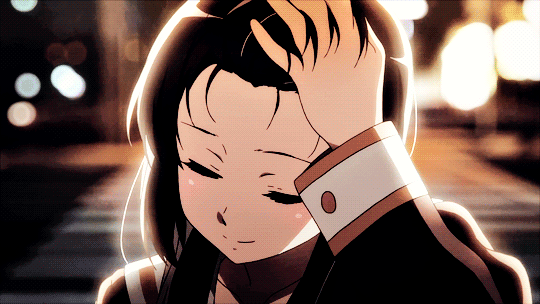
But at the heart of it is the relationship between Kumiko and an old middle school classmate of hers, Reina Kousaka, who is introduced along Kumiko in the very first scene of the series. Reina is ambitious and determined to be the best, with a seemingly cold personality, whereas Kumiko is good natured and inclined to go with the flow. She has one flaw though, a tendency to speak her mind at importune times, as she does in that first scene when Reina is disappointed at their school not going through to the next round and Kumiko is surprised she thought that was even possible with their band. This sets up their dynamic in high school, as Kumiko regrets her words and is slightly in fear of Reina, wanting to apologise and make up but not quite sure how. As it turns out, she needn’t have worried.
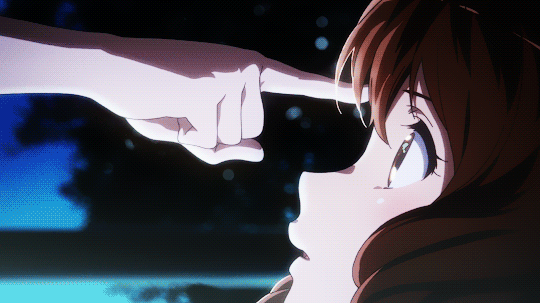
Because it’s pretty clear that the tension between Reina and Kumiko is based on more than just ill feelings… Though in the thirteen episodes so far it’s been teased more than explicitly stated, both have made love declerations. Episode eight in particular, in which Kumiko denies wanting to date her childhood friend and instead asks Reina to go to the Agatha festival with her, is food for shippers. The Reina x Kumiko slow burn romance is one of the best I’ve ever seen in an anime series because it’s so believeable and sweet, rooted in their personalities. Reina’s passion for being the best trumpetist she can be is what attracts Kumiko while Reina is curious about Kumiko’s real personality behind her good girl mask, as it comes out through her habit of making thoughtless, snarky remarks. Their romance doesn’t take away from the larger story, but is bound in with it.
So yeah, a series about a school band is the best series of 2015 for me, one of the best series I’ve ever watched. If you want to try it for yourself, it’s available on Crunchyroll.